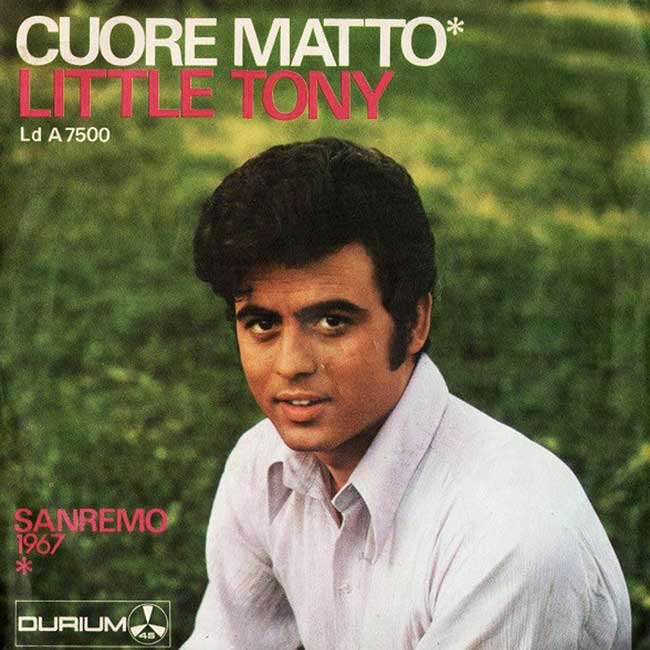Cuore matto

At the end of 1966, Totò wrote Cuore matto. When he had me listen to it, I immediately understood the strength of the piece. We went to the RCA studios in Rome, to mix this Cuore matto, sung by Totò, for Durium. I have a copy here in my house, a rarity. By chance, in another recording room was Dino Caruana, artistic director of Durium, who unbeknownst to us was doing a recording with the famous trumpet player Nini Rosso. In the evening, when we’d finished recording Cuore matto, and were leaving, surprise! We ran into Caruana at the bar. I immediately took advantage of the moment, heavily insisting that he listen to Cuore matto. Caruana, exhausted, didn’t want to know about it, but stubbornly I managed to make him go up the big RCA staircase and back to the room, where the technician, at our request, started playing the recorded piece. As soon as he finished listening, Caruana asked for a copy for himself to take to Durium. I’d convinced him! The heartbeat played by the bass at the beginning of the song was Totò’s brilliant idea. Everyone, since then, has imitated this rhythm. As always, Totò had already written the arrangement for Cuore matto, and conducted the orchestra in the studio and oversaw the final production stages of the record. Instead, the recording by Little Tony, with the arrangement by Totò, was directed by Willy Brezza.
Cuore matto was presented at Sanremo in 1967, but only qualified in seventh place. After the Festival, in the evening, we were invited to dinner by the owners of Durium, our record company, the Mintanjans, husband, wife and daughter. Obviously Little Tony and company came as well, and we went to a restaurant on the seafront, with a bar that had a large multicolored jukebox. As soon as we’d sat down, a stream of kids came into the bar, and kept on putting coins into the juke-box to listen to Cuore matto by my Gaetano. There was a general boisterousness at our table, and Mintanjan’s congratulations to Totò: “You’re a genius!”… words cost nothing! We’d all understood it was already a hit. In fact, the following week it was in first place on the hit parade, and stayed there for five consecutive months, a unique case. The truth is glaring: the real winner of Sanremo is the song that sells the most records. It’s almost never the one that comes first in the competition. And this was the case with Cuore matto. And to think that Little Tony didn’t want to sing it back then! The record company threatened to cancel his contract if he didn’t take it to Sanremo.
This song was instrumental to Tony’s success, and throughout his career. It is known that they called him “Mister Cuore Matto”. Even at his funeral, which I attended along with many colleagues and thousands of admirers, on his coffin, above the flowers, was a copy of the historic 45 rpm. Tony was a dear friend, a simple and kind man. In 2003, he invited us to lunch at his place to talk to Totò, and he asked him to write him an entire CD. Totò accepted but not long after, he was unable to work due to the illness that drained him of all his strength and few months later, carried him off. I want to clarify that the Durium record company declared only a third of all copies of Cuore matto sold, such that Little Tony sued Durium and won, and Durium paid him damages amounting to three hundred and fifty million lire, which was a fortune then. Unfortunately, Totò did not do likewise, and that was a mistake. It’s also true that we were always traveling with our group, which meant we were always busy and had little space for other very important matters like this. However, he did something else: while Cuore matto had been at the top of the hit parade for months, Totò went to speak with the manager of Durium about changing his contract as author and composer, and increasing his royalties, until it came to that miserable moment regarding his author’s rights. When Totò made his request, the manager replied: “If you want we can give you a suit”. Incredible but true, after selling millions of records. So together we decided that it was time for a change of scene and record company. Given its great success, Totò had no difficulty finding another one. Not long after he signed an exclusivity contract in Milan as an author and composer with the major record company CGD, of Ladislao Sugar (and later his son Piero). I signed too, as a singer. It was 1968.
Excerpt from: Savio Schweitzer, Jacqueline, Cuore matto. Da Maledetta primavera agli Squallor. L’opera di Totò Savio nella storia della musica leggera, Rome, Arcana Editore, 2014, pp. 136-139
